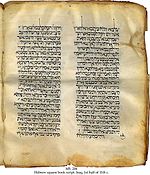Tanakh (Hebrew: תנ״ך) (also Tanach, Hebrew pronunciation: [taˈnax] or [təˈnax], or Tenak, is an acronym that identifies the Hebrew Bible. The acronym is based on the initial Hebrew letters of each of the text's three parts:
1. Torah תורה meaning "Instruction". Also called the Chumash חומש meaning: "The five"; "The five books of Moses." Also called the "Pentateuch." The Torah is often referred to as the law of the Jewish people.
2. Nevi'im נביאים meaning "Prophets." This term is associated with anything to do with the prophets.
3. Ketuvim כתובים meaning "Writings" or "Hagiographa."
The writings are then separated into sections, for example; there are a group of history books namely, Ezra, Chronicles and Nehemiah. Others include the wisdom books these are: Job, Ecclesiastes and Proverbs. Poetry books; Psalms, Lamentation and Song of Solomon. Lastly there are other books, Ruth, Esther and the book of Daniel. The Tanakh is also called מקרא, Mikra or Miqra, meaning "that which is read."
